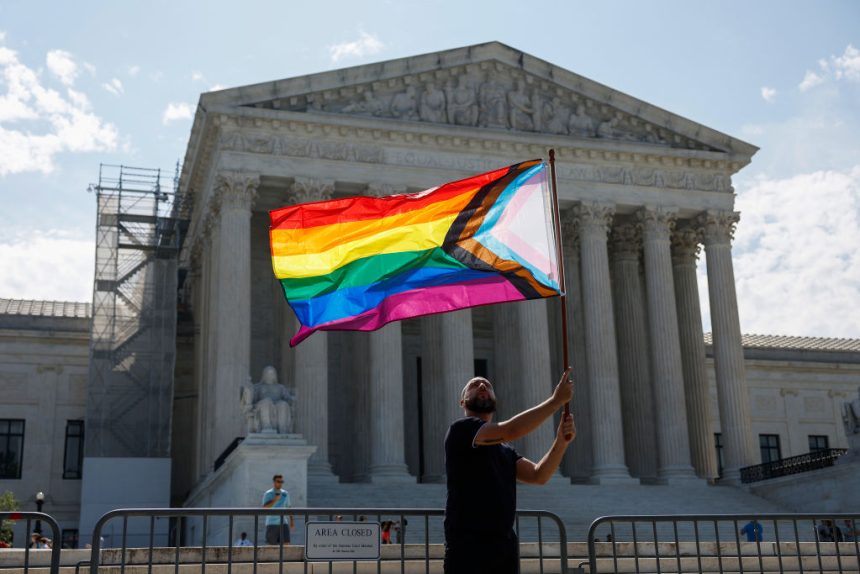The U.S. Supreme Court on Tuesday is scheduled to hear oral arguments in a case that could impact state laws around the country that ban “conversion therapy,” a controversial counseling practice for LGBTQ+ youth. (Photo by Anna Moneymaker/Getty Images)
The U.S. Supreme Court on Tuesday is scheduled to hear oral arguments in a case that could reverse or solidify state laws across the country that ban a controversial counseling practice for LGBTQ+ youth.
The case challenges a 2019 Colorado law that bans “conversion therapy” for children and teens. Conversion therapy is a catchall term for efforts to change the sexual orientation or gender identity of LGBTQ+ people. Sometimes called “reparative therapy,” it can range from talk therapy and religious counseling to electrical shocks, pain-inducing aversion therapy and physical isolation. The therapy has been widely discredited by medical groups.
More than half of states — including some led by Republicans — have banned or restricted the practice for children and teens since California became the first to do so in 2012, according to the Movement Advancement Project, a left-leaning nonprofit research organization that tracks LGBTQ+-related laws and policies.
In recent years, however, Republicans in several states have worked to reverse bans, with some success. A poll in June by Data for Progress, a liberal think tank, found that although less than half of Republican voters, 43%, support or strongly support conversion therapy, more than half — 56% — said the Supreme Court ought to allow states to ban it.
A decision in the Colorado case, expected next year, could have far-reaching ramifications for dozens of other states.
“I think we’re all really worried about the implications,” said Cliff Rosky, a professor of law at the University of Utah. Rosky helped draft Utah’s 2023 law prohibiting licensed professionals from practicing conversion therapy on LGBTQ+ youth. That measure unanimously passed the Republican-controlled legislature.
“We certainly hope the court will uphold the right of states to regulate the behavior of therapists that it licenses and protect children from a lethal public health threat,” he told Stateline.
The impact on other states’ laws would depend on the scope of the high court’s ruling. But most of those laws are similar to Colorado’s, Rosky said.
“Certainly, a broad ruling against Colorado’s law would jeopardize the constitutionality of all the other laws.”
In Chiles v. Salazar, a licensed counselor in Colorado Springs, Kaley Chiles, sued state officials in 2022 over a law that bars licensed mental health professionals from conducting conversion therapy on clients under 18. She argues the law violates her First Amendment right to free speech and interferes with her ability to practice counseling in a way that aligns with her religious convictions. Chiles is represented by conservative religious law firm Alliance Defending Freedom.
“The government has no business censoring private conversations between clients and counselors,” Jim Campbell, chief legal counsel for Alliance Defending Freedom, said in a news release when the group filed its opening brief in June. “Colorado’s law harms these young people by depriving them of caring and compassionate conversations with a counselor who helps them pursue the goals they desire.”
Colorado Attorney General Phil Weiser, a Democrat, said in an August news conference that the law doesn’t prohibit a provider from sharing information or viewpoints with a patient, and that therapists are still allowed to talk with patients about conversion practices offered by religious groups.
But he called conversion therapy a “substandard, discredited practice.” Conversion therapy has been denounced by major medical organizations including the American Medical Association, the American Psychological Association, the American Psychiatric Association and the American Academy of Child and Adolescent Psychiatry.
“This practice has been used in the past to try to force patients to change their sexual orientation or their gender identity,” Weiser said. “The science, however, says that this practice is harmful. It doesn’t work.
“Regardless of how it’s performed, there can be real harms from this practice. And those harms can include depression, self-hatred, loss of faith, even suicide.”
The key question in the case is whether Colorado’s law regulates professional standards of conduct and speech, or whether it attempts to regulate the right to free speech, said Marie-Amélie George, a legal historian who has published extensively on LGBTQ+ rights and is a professor of law at Wake Forest University School of Law.
“What is really interesting about these laws is that most licensed health professionals don’t offer conversion therapy because professional associations across the board have condemned it as extremely harmful,” George told Stateline. After the mainstream mental health community disavowed efforts to change people’s sexual orientation by the late 1980s, conversion therapy “became primarily the province of religious and lay ministers,” she said.
State laws like Colorado’s don’t restrict clergy and lay ministers from engaging in conversion therapy, she said. They address only the small subset of state-licensed mental health professionals who wish to use it.
In August, attorneys general in 20 states and the District of Columbia filed an amicus brief supporting Colorado’s law. They argue the First Amendment doesn’t shield mental health practices from regulation when the state deems them dangerous or ineffective, and that states have a long and established history of regulating professional standards of care.
The decision in this case will probably affect all of the conversion therapy bans in this country.
– Marie-Amélie George, Wake Forest University School of Law professor
Colorado isn’t the only recent battleground over conversion therapy, as conservative majorities in the courts, state legislatures and at the federal level have opened the door for Republican lawmakers and conservative Christian groups to reinstate the practice.
Earlier this year, Kentucky’s Republican-controlled legislature passed a bill canceling Democratic Gov. Andy Beshear’s 2024 executive order that banned conversion therapy for minors. Beshear promptly vetoed the bill, but the legislature overrode his veto in March.
In April, a coalition of Republican attorneys general from 11 states, led by Iowa and South Carolina, appealed a January decision by a U.S. district court judge to uphold a 2023 Michigan law that’s similar to Colorado’s. It prohibits mental health professionals from trying to alter a minor’s sexual orientation or gender identity. The case began when Catholic Charities of three Michigan counties filed a lawsuit targeting Michigan’s law in 2024 on behalf of a licensed therapist.
In July, a Virginia court partially struck down the state’s 2020 ban on conversion therapy for minors. Republican lawmakers in Michigan introduced a bill in July to repeal their state’s ban, while Missouri’s Republican attorney general sued to overturn local conversion therapy bans.
From the mid-1990s until the mid-2010s, LGBTQ+ rights advocates won a lot of cases before the U.S. Supreme Court, said George, the Wake Forest professor.
“But in the years since, the Supreme Court has been more hostile to LGBTQ+ rights claims,” she said. “I think, with the political environment of the court, it will be interesting to see what they do given how they have treated other LGBTQ+ rights cases in recent years.
“States are extremely similar in the laws they have enacted, so the decision in this case will probably affect all of the conversion therapy bans in this country.”
Stateline reporter Anna Claire Vollers can be reached at avollers@stateline.org.









